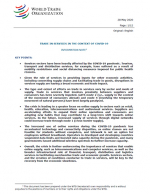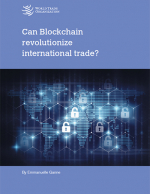Trade in Services in the Context of COVID-19
This document aims to provide information on the early impact of the COVID-19 pandemic on trade in services in different sectors and modes of supply.
COVID-19 Impact on the Services Sectors
Services sectors have been heavily affected by the COVID-19 outbreak.
Given the sector's role in providing inputs for other economic activities, including facilitating supply chains and trade in goods, disruptions in services supply are having a broad economic and trade impact.
Services now generate more than two-thirds of economic output, attract over two-thirds of foreign direct investment, provide most jobs globally, and account for over 40 percent of world trade.
Furthermore, since services account for most of women’s employment globally and a large share of micro, small and medium-sized enterprise (MSME) activity, the disruption in services supply also impacts social and economic inclusiveness.
Drops in demand and supply have strongly impacted services trade, though the type and extent of the impact vary by sector and mode of supply.
Services that rely on physical proximity between suppliers and consumers have been most impacted by mobility restrictions and social distancing measures imposed for public health reasons.
While direct contact can sometimes be substituted by remote supply, but this is not necessarily the case in all services sectors or countries.
Sectors such as distribution (especially retailing services), tourism and passenger transport have been heavily affected. Mobility-related measures have created significant disruptions in air, maritime, and land transportation, with severe repercussions on goods trade and supply chains.
Key Points:
- Services sectors have been heavily affected by the COVID-19 pandemic. Tourism, transport, and distribution services, for example, have suffered as a result of mobility restrictions and social distancing measures imposed for public health reasons. At the same time, the crisis has underscored the importance of services that enable online supply, such as telecommunications and computer services, as well as the broader infrastructural role of transport, financial, distribution and logistics services in facilitating trade and economic growth.
- Given the role of services in providing inputs for other economic activities, including connecting supply chains and facilitating trade in goods, disruptions in services supply are having a broad economic and trade impact.
- The type and extent of effects on trade in services vary by sector and mode of supply. Trade-in services that involve proximity between suppliers and consumers have been severely impeded. GATS mode 2 (i.e., supply in the context of the movement of consumers abroad) and mode 4 (involving the temporary movement of natural persons) have been largely paralyzed.
- The crisis is leading to a greater focus on online supply in sectors such as retail, health, education, telecommunications, and audiovisual services. Suppliers are accelerating efforts to expand their online operations and consumers are adopting new habits that may contribute to a long-term shift towards online services. In the future, the increased supply of services through digital networks could increase trade through mode 1 (cross-border supply).
- The increased use of online services during the COVID-19 pandemic has accentuated technology and connectivity disparities, as online classes are not feasible for students without computers, and telework is not an option for employees without broadband. Operators in developed and developing countries suspended data limits and boosted data capacity during the pandemic, and many governments issued an additional wireless spectrum to further increase capacity.
- Services sectors, and the creation of conditions conducive to trade in services, will be key to the recovery from the economic slowdown.
What’s Related




Favorites





